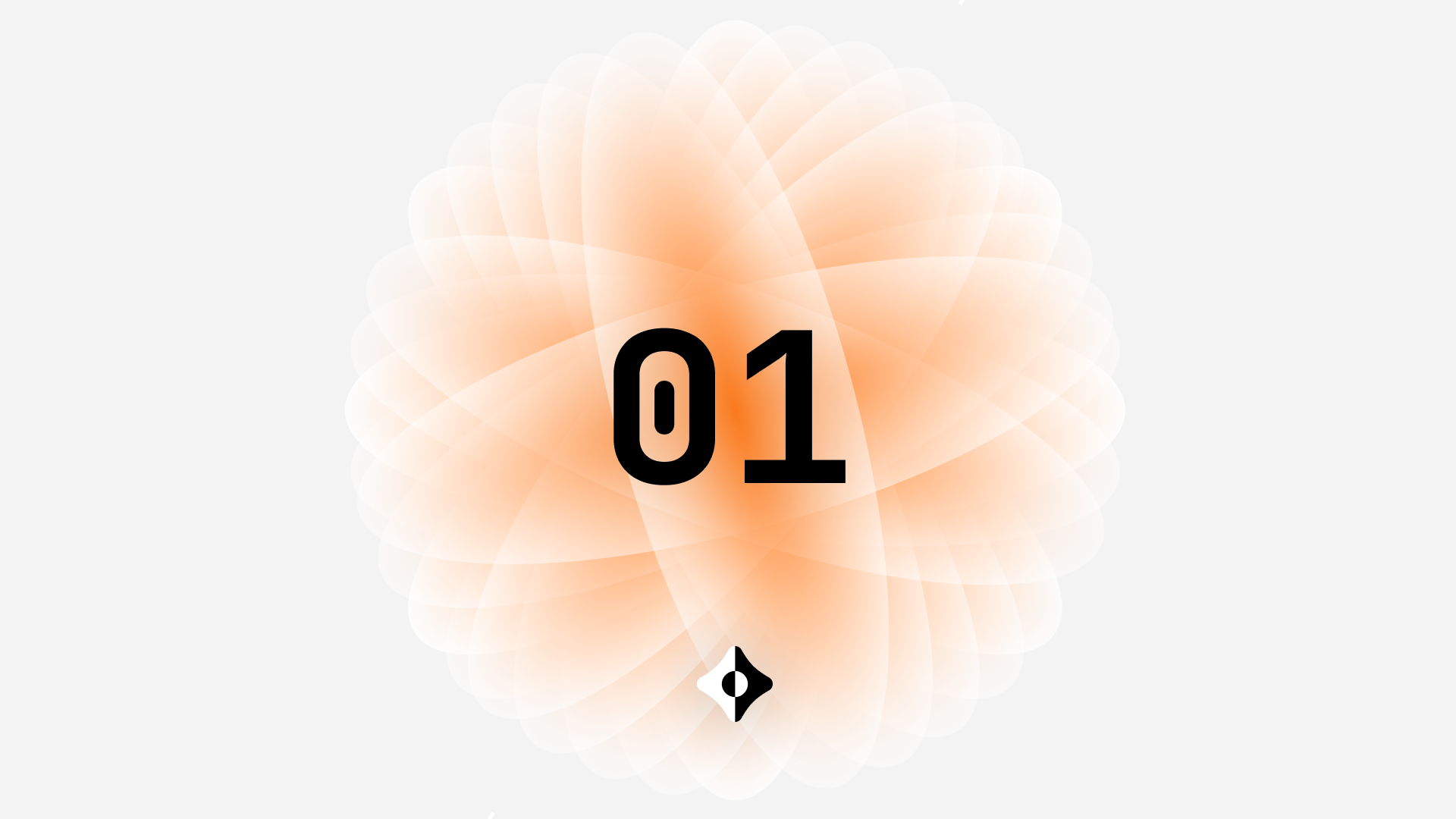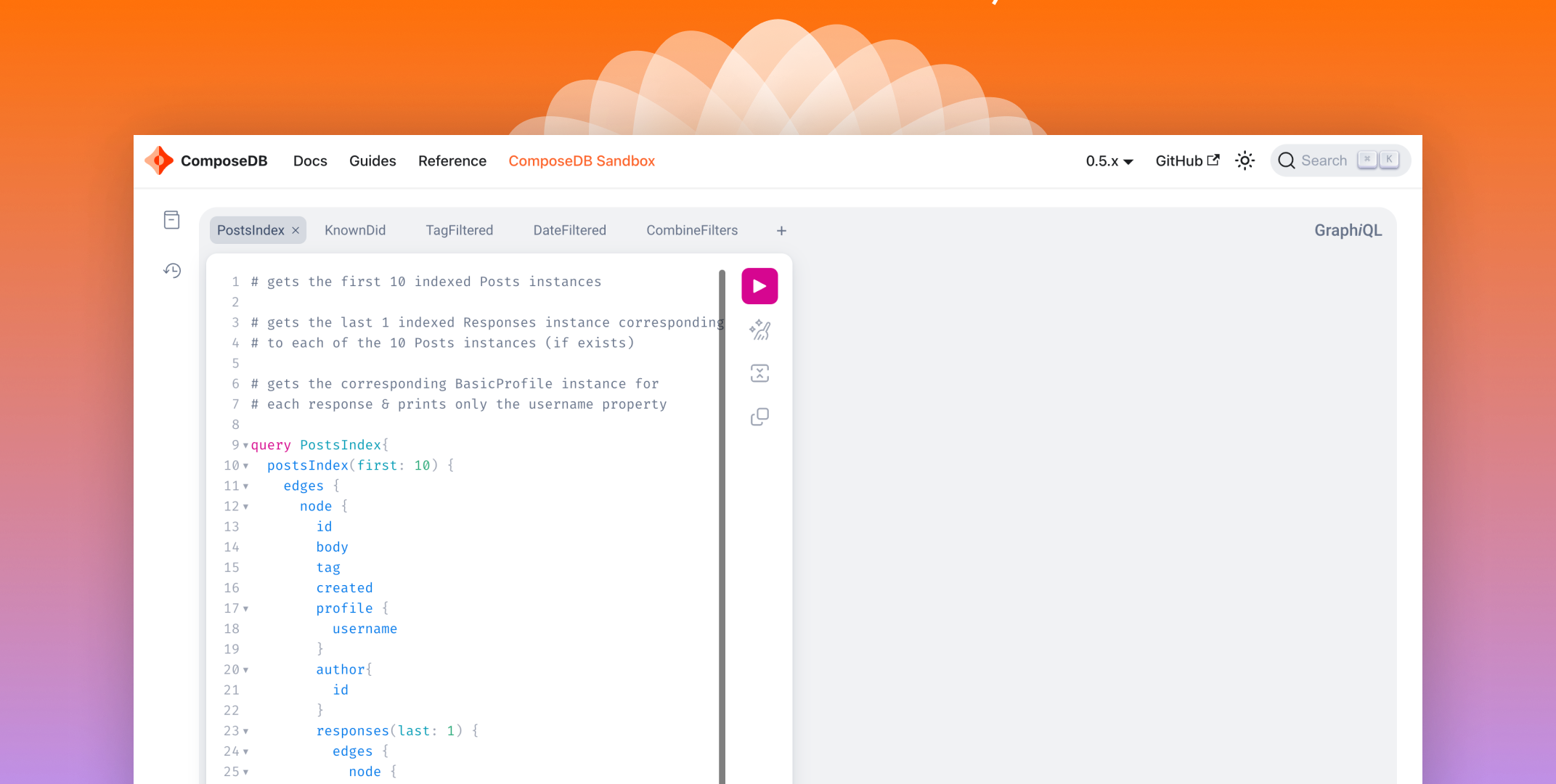CeramicWorld 01
Hello and welcome to the first edition of CeramicWorld, a monthly roundup of everything happening across the Ceramic ecosystem.

Hello and welcome to the first edition of CeramicWorld, a monthly roundup of everything happening across the Ceramic ecosystem.
Ceramic Community Signup!

Community is really important to us at Ceramic! We'd like to know more about you and what you're working on, so we can create better technology and experiences.
Click the link below to learn more about the tech, meet the team, become an official Ceramic community member, explore integrations and partnerships, or share your project.
Play with ComposeDB’s no-code sandbox

ComposeDB Sandbox is an awesome no-hassle way to try ComposeDB's GraphQL API without needing to install anything. While playing in the sandbox, you'll also notice that ComposeDB now supports query filtering and ordering, which allows developers to filter and/or order the results of their data queries.
Watch Optimism, Base, MetaMask, Karma3 discuss decentralized reputation @ RepConnect Istanbul
Watch MetaMask, Optimism, Base, and Karma3 share learnings from building industry-leading reputation products, protocols, and systems. For even more content, catch the full RepConnect Summit Istanbul Recap.
We’re going to be hosting a sequel event at ETHDenver, so be sure to keep your eyes peeled for a signup form posted on our Twitter account.
PriceFeed dataset is on fire! 📈

As crypto markets pick up, so does interest in coin prices. Over the last month, we’ve seen the PriceFeed dataset emerge on Ceramic mainnet, rapidly growing from obscurity to more than 70K entries at time of writing. As an example, this document stores a “snapshot” of the price of Solana ($SOL) at a given moment, but there are also others for Ethereum ($ETH) and Bitcoin ($BTC).
PriceFeed is also notable in that it’s the first dataset on mainnet authored by a “data oracle,” responsible for bridging the gap between data that exists elsewhere and Ceramic. Just as oracles play an important role in blockchain networks, we expect data oracles to play a huge role in generating verifiable datasets in Ceramic.
Since the PriceFeed dataset exists on Ceramic mainnet and continues to grow everyday, you can now query, compose, and remix this data in your applications.
Recon, scalability protocol, enters final testing

Core devs are finalizing development on Recon, a set reconciliation protocol for syncing data between Ceramic nodes. Recon is a more scalable, purpose-built alternative to IPFS pubsub that enables improved efficiency and greater controls for how data is synced between Ceramic nodes. For an idea of performance gains, during early testing Recon was able to publish 1M streams to Ceramic in under an hour.
Devtools
Improved Ceramic developer portal
Ceramic documentation has gone through a major update. There’s now a landing page to welcome developers and serve as a jumping-off point on their Ceramic journey. The site also now includes the docs for ComposeDB and Decentralized Identifiers, so there’s only one site to worry about. Visit the new site to get started playing or building with verifiable data.
Cerscan and S3 Explorers display richer network data
The S3.xyz hub offers exciting ways for developers to view activity across the network, from ComposeDB model usage to application-level views, and more. Developers can also query an embedded GraphQL instance while inspecting ComposeDB schemas, adding allowing users to run pre-crafted queries, or create custom queries of their own.
Cerscan gets its own set of improvements too!
HireNodes offers commercial-grade Ceramic node hosting
When you’re ready to move from testnet to mainnet, you may face new challenges of scalability, reliability, security, and cost-effectiveness. HireNodes has emerged as an early leader in Ceramic node hosting for project looking for production grade deployments.
Intuition, decentralized reputation protocol, enters private alpha
Intuition, an attestations and credentials protocol built on Ethereum and ComposeDB, is now live on mainnet for their private alpha.
Tutorial: Storing Ethereum Attestation Service (EAS) attestations on Ceramic
Ethereum Attestation Service (EAS) is a protocol for credentials used by some of the most popular dapps, DAOs, and Web3 communities. Now you can use Ceramic as a storage backend for EAS attestations. There's a great tutorial on the official EAS documentation site for how to store your EAS credentials on Ceramic.
Ceramic Protocol
Upgrade to Ceramic v3!
Ceramic v3 is out now with Node.js version 20 support. It’s a major update that allows developers to leverage the most recent features and performance updates of Node.js. Developers are strongly advised to upgrade their Ceramic nodes to v3, as older node versions will no longer receive active technical support and bug fixes. In addition to the Node.js version update, Ceramic v3 bids farewell to all legacy, non-standard DID methods like DID:ETH, DID:NFT, and DID:SAFE.
Firehose API development underway
3Box Labs is kicking off work on the Firehose API. Firehose is a new set of Ceramic APIs that will enable developers to build their own custom database and indexing solutions, such as a ComposeDB alternative, on top of Ceramic’s stream APIs. This project is still in the early stages of development. Keep an eye on Ceramic public roadmap for status updates.
Want to join Ceramic Core Devs?
Catch up on notes from past calls and add the Ceramic Calendar to join a future one.

